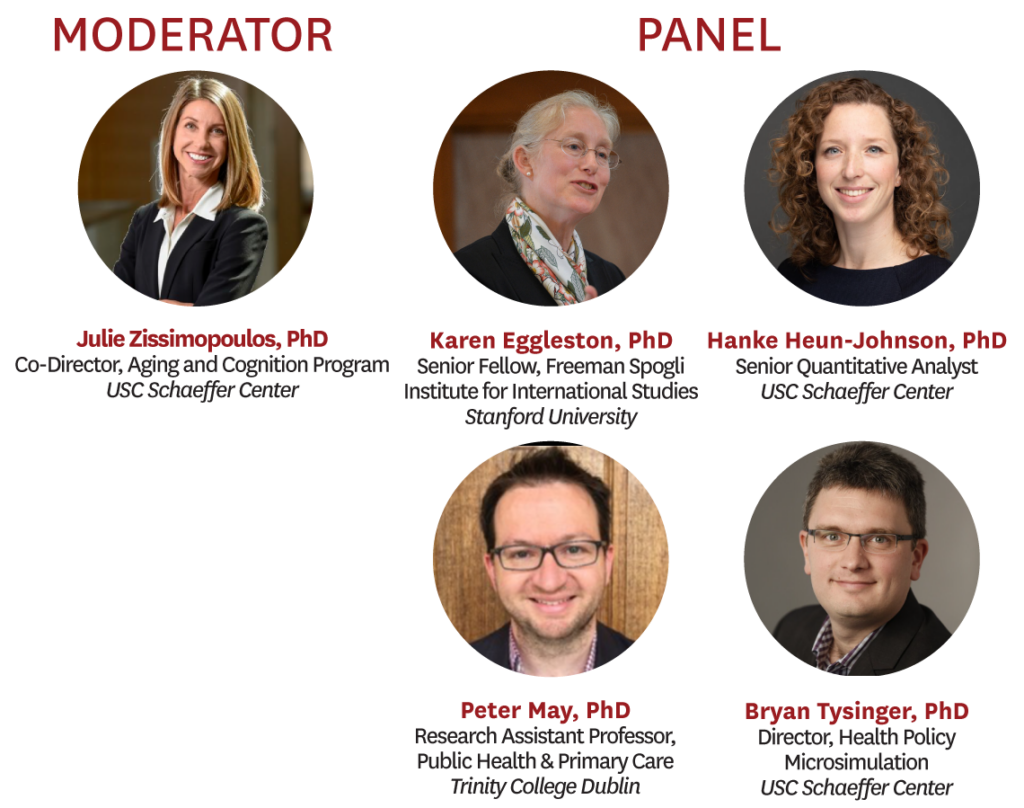Forecasting the health of populations is integral to setting evidence-based policies to improve population health, ensure high quality care and advance equity. As the population with Alzheimer’s and Alzheimer’s related dementias (AD/ADRD) grows – and new treatments become available – projections of the prevalence of AD/ADRD, as well as the health equity and cost of care implications of novel treatments are increasingly important. The Schaeffer Center has pioneered microsimulation models and collaborated with researchers from around the world to model the health and economic consequences of AD/ADRD.
On March 9, join the Schaeffer Center for a seminar on the projections of population-level cognitive impairment and dementia in the US, Ireland, Japan and Mexico. The expert panel will also discuss how simulation modeling can be used for projecting costs and health outcomes of new therapeutics for AD/ADRD.
- Event Date
- Wednesday, March 09, 2022
2:00 PM - 3:00 PM Pacific - Location

Julie Zissimopoulos, PhD (Moderator), is Associate Professor in the Sol Price School of Public Policy at the University of Southern California. In addition to her faculty appointment, she is Senior Fellow and Director of Aging and Cognition Research Program and Research Training at the Schaeffer Center for Health Policy and Economics. She is Director of USC’s Resource Center for Minority Aging Research, and Center for Advancing Sociodemographic and Economic Study of Alzheimer’s Disease and Related Dementias (CeASES-ADRD), both focused on reducing burden of Alzheimer’s disease and funded by the National Institute on Aging. Dr. Zissimopoulos’ current research focuses on economic costs of dementia, impacts of dementia on care partners, the use of and response to drug therapies for non-dementia conditions that influence risk of dementia; racial and ethnic disparities in diagnosis and health care treatment for dementia. Dr. Zissimopoulos received her B.A. summa cum laude from Boston College, her M.A. from Columbia University, and a Ph.D. in economics from the University of California, Los Angeles.
Karen Eggleston, PhD, is Senior Fellow at the Freeman Spogli Institute for International Studies (FSI) at Stanford University and Director of the Asia Health Policy Program at the Shorenstein Asia-Pacific Research Center, FSI. She is an affiliate of the health economics program of the National Bureau of Economic Research. Her research focuses on healthcare productivity, government and market roles in the health sector, and the economics of the demographic transition, especially in Japan, Korea, China and India. She served on the Strategic Technical Advisory Committee for the Asia Pacific Observatory on Health Systems and Policies, and has been a consultant to the World Bank, the Asian Development Bank, and the WHO. Eggleston earned her PhD in public policy from Harvard University and has MA degrees in economics and Asian studies from the University of Hawaii and a BA in Asian studies summa cum laude (valedictorian) from Dartmouth College.
Hanke Heun-Johnson, PhD, is a senior quantitative analyst in the microsimulation team at the USC Schaeffer Center. Her current research is focused on cognition, COVID-19, obesity, and adverse childhood experiences, using dynamic microsimulations to model health and economic outcomes. In a prior position at the Schaeffer Center, she studied mental healthcare access and early interventions for the Keck-Schaeffer Initiative for Population Health Policy. Before joining the Schaeffer Center, her dissertation research focused on the interaction effects of early-life stress and genetic variations on brain circuit development and behavior at Children’s Hospital Los Angeles. She received her PhD in neuroscience from the University of Southern California, a master's in molecular biology, and a BSc in biological health sciences from Maastricht University in the Netherlands.
Peter May, PhD, is a health economist at Trinity College Dublin, Ireland with a focus on palliative and end-of-life care. He works with a network of collaborators across the United States, United Kingdom and European Union using a range of study designs including multi-country randomized trials, quasi-experiments, prospective cohort studies, longitudinal studies on ageing, and retrospective analysis of routinely collected data. His particular research interests include heterogeneity of treatment effects, outcome measurement in end-of-life care and medical decision-making under high complexity and uncertainty.
Bryan Tysinger, PhD, is a research assistant professor at the Sol Price School of Public Policy and director of health policy microsimulation at the USC Schaeffer Center. His research focuses on modeling health and economic outcomes over the life course, with emphasis on identifying policy solutions to improve initial trajectories for the young, course-correct for those at middle-age, and manage the aging process. He works extensively with dynamic microsimulation models, developing and refining the Future Elderly Model (FEM) and Future Adult Model (FAM) and expanding these models globally. As microsimulation director, he oversees the technical development team, assesses the feasibility of new projects, and establishes priorities for development to support the center’s goals. Tysinger earned a BS in applied mathematics, with distinction, from Harvey Mudd College. He holds a Master’s in policy analysis and a PhD in policy analysis from the Pardee RAND Graduate School.
